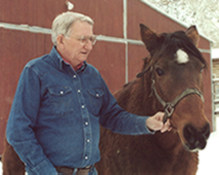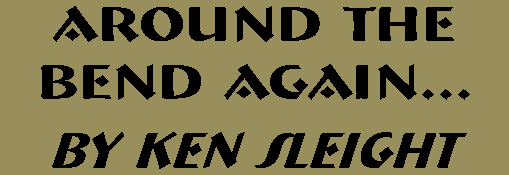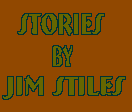

THE FIGHT TO PRESERVE OUR GRAZING LANDS
T.S. Eliot once wrote, “It’s interesting to cut yourself to pieces once in a while, and wait to see if the fragments will sprout.”
My granddad often called me a sprout--a small sprig checking the world out. So I now cut myself and the community to pieces here, and wait to see if the fragments do sprout or if it's all just a blowin’ in the wind.
Let me entertain some of these fragments. A few years ago, at a full-house government hearing concerning wilderness, some of us wore green arm bands to convey our support of the Wilderness Act. After the hearing, fellow Bear Laker from Idaho, Booth Wallentine, the Executive Director of the Utah Farm Bureau, sidled up to me, gazed down at my boots and retorted, “All that Bear Lake manure has fallen from your boots!” Meaning, I think, that I had forsaken my Bear Lake heritage in supporting wilderness designation for many of our lands. His witty remark cut to the quick.
The reader must know that I come from a long line of farmers and stockmen, and the use of the ranges has meant much to our survival and that of our neighbors.
As a kid, I often stayed with my grandparents Peterson in Ovid. I loved the tiny two-roomed farmhouse where they had raised their family. Working about the farmyard and tending the cattle delighted me. I especially enjoyed trailing the cattle to the public rangelands and to the Bear River bottoms.
Grandpa and I would ride our horses hour after hour through the pines and quaking aspen groves. The grass was high and the streams cascaded to the floor below. Cows grazed in the meadows. This was true wilderness to me. Forgotten momentarily were the many labors of my kin, the lost lives, and the sacrifices they made.
I listened intently to the stories of the settlement and colonization in 1863 of the Bear Lake Valley. I noted how my own great granddad had been of the first party to settle, and how they had to deal with the Indian people that they were about to replace. A great era ended for those Indian people after their massacre on the Bear River. It was a period of cruel and great change for them. It meant an end to many of them and they suffered immensely.
My folks in Paris operated a feed store. And I grew up helping in the operation, grinding and cleaning the grains that came in from the farmers and ranchers throughout our county. When in high school I joined the Future Farmers of America and studied a host of agrarian subjects. I still remember in part, the club’s article of faith that went something like this:
“We believe in the future of farming with a faith born not of words but of deeds, achievements, born in the promise of better days through better ways...as handed down to us from past generations.”
Those words have stuck in my mind these many years.
My folks bought a farm in Woods Cross, Utah in 1940, and in moving there I had a continuous and enjoyable time in helping work the farm and in raising livestock. Back in the early 1900's the federal land agencies allowed wholesale degradation of our lands. Having barbwired all of Texas, the Census Bureau in 1890 declared the frontier closed. But in a few years the Texas cowboys, financed by the barons of England, the forefront of the destructive corporate-type cattle companies drove thousands upon thousands of cattle to the canyon country of Utah to graze on the luscious plants and grasses. With catastrophic results, they decimated the ranges and the resultant erosion cut new gulches. With the grass now gone, the huge companies departed. Left behind were the smaller farmer/ranchers to pick up the pieces.
Year after year, generation after generation, some families remained on the land. It’s ironic that these people, though now attacked, helped to hold the public grazing lands intact through these many years. In 1934 Congress passed the Taylor Grazing Act which apportioned grazing allotments to those that remained.
In 1963 came the completion of the disastrous Glen Canyon Dam, and the ranchers and the Navajo people were evicted from their grazing lands along the Colorado River. The destructive reservoir removed the cows and the wildlife and millions of people replaced them.
During the following year, the Wilderness Act established the National Wilderness Preservation System. The American people recognized the value of grazing. Under its provisions, grazing could continue. As most cattle people were extremely apprehensive, they wanted none of it. It would entail greater government encroachment.
I did my best to explain my position to my rancher friends in actively supporting the measure and why I believed they ought to support it too. As it turns out their fears were indeed justified and I was wrong in some of my assumptions. Their welfare is indeed threatened by the past and present cries of some environmental slogans as “Cattle-Free by ‘03."
I will never forget my years in Escalante--the uprooting of my own family to live within the Escalante wilderness country, and to be closer to many of my kin and friends who resided throughout the canyon country. My own great, great-grandfather George Spencer, who left three wives and many children, helped settle southwestern Utah. My great granddad Miles settled in Johnson Canyon and the Kanab country. He once resided and taught school in Escalante. My grandmother was born in Glendale. My ancestors eventually permeated nearly every Mormon town in southern Utah. And most of them were farmers and ranchers.
And so it was good for me to make the move to Escalante. Of the friendship and help of the people, there were friends like Lloyd Gates who continuously scrounged pack horses and mules for me from other local ranchers. Reeves Baker, who had his own grazing permit, became my head wrangler. Mac Lefevre, who often left his own ranching responsibilities, joined with me on many occasions. A multitude of other ranching friends stepped forward to pack and wrangle the horses when needed.
In Escalante, a few of us founded the Escalante Chamber of Commerce, and I became its first president. We had many lively arguments concerning town government, roads, health care, economics, mining, tourism, the environment, and a host of other subjects ordinarily dealt with by a Chamber of Commerce. A large group of concerned citizens we were. It was like a town meeting, and at varied times everything was discussed and in the open. Democracy in action.
As Escalante was dependent economically on grazing the public lands, the issue was of prime importance and we dealt with that too. We talked about the need to reclaim the watersheds and the carrying capacity of the range. We were concerned with the need to provide needed water and reclamation projects to sustain our beautiful fields of alfalfa and green grass.
There were other environmental issues too. In particular, I objected to the State of Utah’s proposal to build a road across the Waterpocket Fold and the lower Escalante Canyon. The road would connect the Bullfrog Marina to the Wahweap Marina. Working actively with the Sierra Club and other groups we were able to defeat the horrid measure.
And some of us fought hard against a steep dugway-type road, proposed by the BLM, that would be gouged out of the cliff face of Fifty Mile Mountain. BLM’s purpose was supposedly to service the cattle that grazed there. There were many wild cattle. The plateau is a favorite of mine in that some wilderness values still can be felt there. With the great assistance of Secretary of Interior Stewart Udall, we beat that proposed road too.
Congress passed the National Environmental Policy Act of 1969 that mandated the consideration of the environment before any major federal action was taken. However, over the years this law has been seriously maligned and circumvented. Especially onerous was President Clinton’s declaration of the Escalante region as a part of the Grand Staircase and Escalante National Monument. His actions stunned the citizens. I was very upset that nary a study or the preparation of an EIS was undertaken as prescribed by law. Everything we worked for--the dream of the region under a wilderness designation--went down the drain because some environmentalists gained the political ear of the President.
We now expect increased development and the further destruction of that great land. Huge chunks of money are already pouring in. Placing this region under a "national monument" label guarantees roads and more roads, trails and more trails. The impact will be thousands of times greater than the grazing of cows. To me, this event is an environmental tragedy, second only in the history of the canyon country, to the Glen Canyon Dam.
Talk about lives being fragmentized--this is it. An environmental nightmare looms before us and life as we know it vanishes too. The family farms and ranches will surely be divided and then sub-divided again. We now await the dreaded developers who plotted and paved the way toward sprawl. Corporations equate sprawl as “growth” which means huge profits to them.
The canyon wilderness is now surely dwindling. We mouth that great romantic word “wilderness” for the want of a truer descriptive term. This dynamic name still lingers as it has a ring to it--a ring of wild and former days.
Yet I know that those "wild" days were full of contradictions. Grazing surely causes significant impacts on the land, especially in the dry and fragile desert.
Abbey and I once tried to return to our farm days. We bought a little farm at Willow Bend upriver from Green River, Utah. I took over the grazing permit. (I still have my branding iron--WB.) But when I drove a few head of cows to the Price River canyon I found no grass as it was terribly overgrazed. That ended my grazing career.
But any use of the land has an impact. With ranching there are ways to minimize the impacts; ranchers can be good stewards. Past practices may no longer be acceptable. There is little argument there. I remember my old college professor, Walter Cottom, lecturing on the question of whether Utah was Sahara-bound due to overgrazing and other practices. There were many mistakes made then that we don’t want to make again.
We need to get on with range rehabilitation and deal with the matters of erosion and the need to bring back the soil where it has been lost. It will demand better management and it will take a program of rotation and rest. Merely cutting the numbers of stock is not always the answer; it’s the distribution of that stock from place to place on the range that is often the answer. Keep movin’ those cows. Even then some areas may need grazing cuts.
Better ecological methods can be found. Part of the grazing fee should be used to pay for some of the improvements and studies. The solution here is to have wise stewardship--to graze responsibly. And if we are ignorant of the ways, we are certainly capable of learning how to do it.
The day of reckoning is here. The future of ranching and grazing must be considered. In some cases, grazing has indeed become a “right’ and not merely a “privilege.” as some maintain. It certainly has become a right, through long and continuous usage, to continue to graze the forage of that land. For generations, these rights were reenforced with the blessings of the agencies themselves.
Finally the small family ranchers and farmers, on farms and property inherited from generations of family before them, ought to be paid by the government to retire a permit if it is required or desired to do so. The environmental community could also divvy up some money in this regard.
Of course there are some areas that are so sensitive from an ecological standpoint that cattle should never be allowed. Just as there are places that humans should never be allowed. If a rancher fails to work to keep the ranges in good shape, in cooperation with the managing land agencies, this would be their choice, and they would pay the consequence.
One of the largest problems today is that we have too many people in our beloved country. And many of those people desire to visit our canyons. Years ago, Hardy Redd voluntarily retired his cattle from Grand Gulch. But the irony is that the impact of his cattle on the land was nothing like the thousands of persons now flooding the canyon. Cedar Mesa now has some 40 outfitters bringing more and more people to the area. We’ve traded the cattle impacts for people impacts.
If we’re really to be consistent shouldn't we keep the hordes of people off the land as well as cows?.
Abbey and I used to chat about the government roping off a vast area with no one allowed to go into it. No people, no cows, no horses, no scientists, no guides, no Boy Scouts, no environmentalists, no politicians--no one. Leave it to the Gods, the wilds, and the wildlife. Just leave it alone!
Thousands of persons now tramp over areas where cows once wandered. What we need at the very least is a new allotment management plan for the hikers and campers--a carrying capacity study as was done for cattle. Hikers will rue the day that they despised the presence, the look, the smell or the moo of a cow. The presence of shoulder-to-shoulder mass of people and their own excrement is surely worse.
This is not the way it’s supposed to be, but it’s the way it turned out. This is the end of a great era. Instead of singing this land is our land, we can only wail that this land was our land. Maybe something good will sprout from the evil of all of this, but I doubt it.
So here’s to my rancher kin and friends. I lift a cup to toast you in holding this great land together for us so that it wouldn’t be cut up like the rest of the country.
And a toast to you Booth Wallentine for reminding me of my roots and my heritage. Time will tell whether any of our other fragments have sprouted.
Email comments to ksleight@lasal.net






